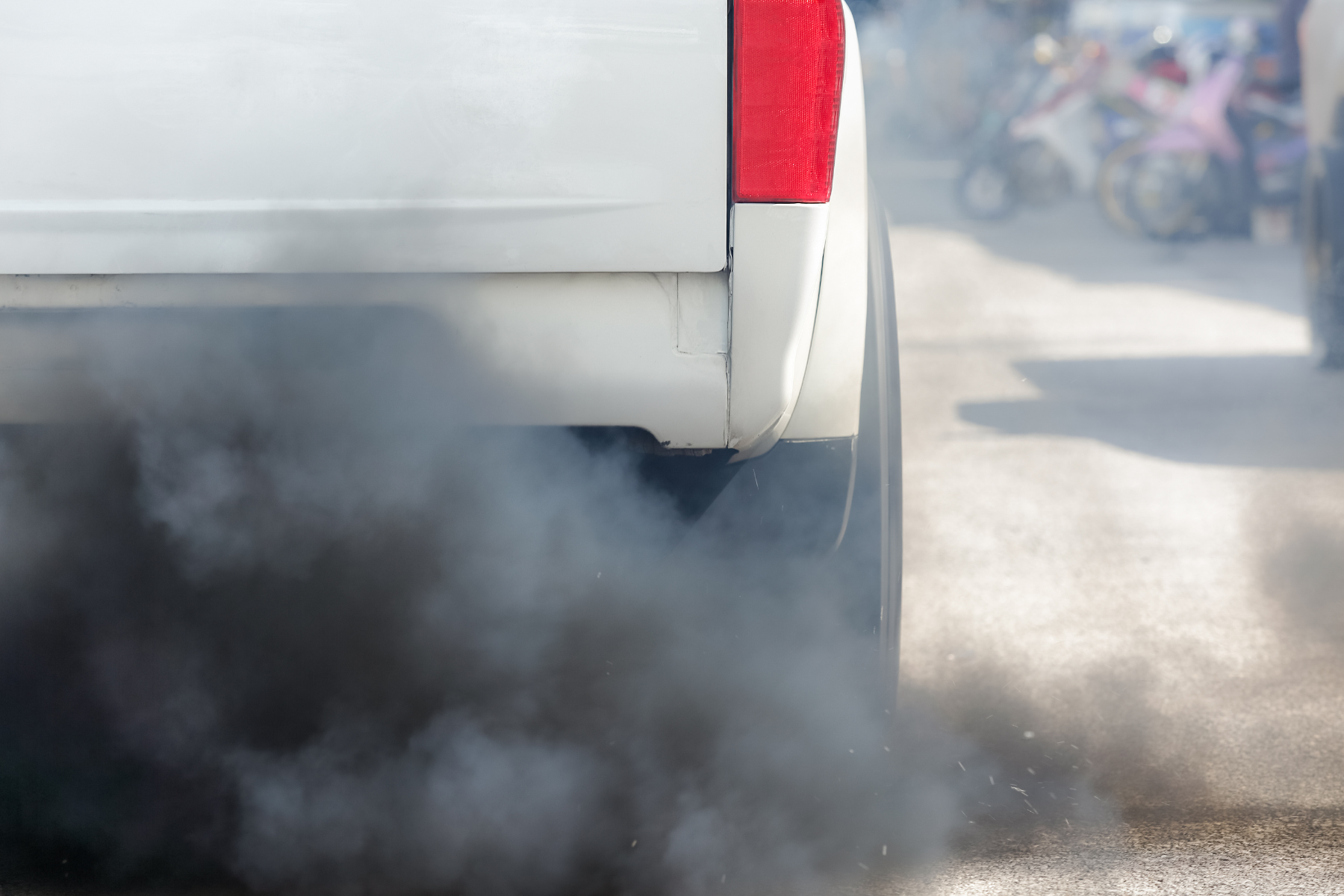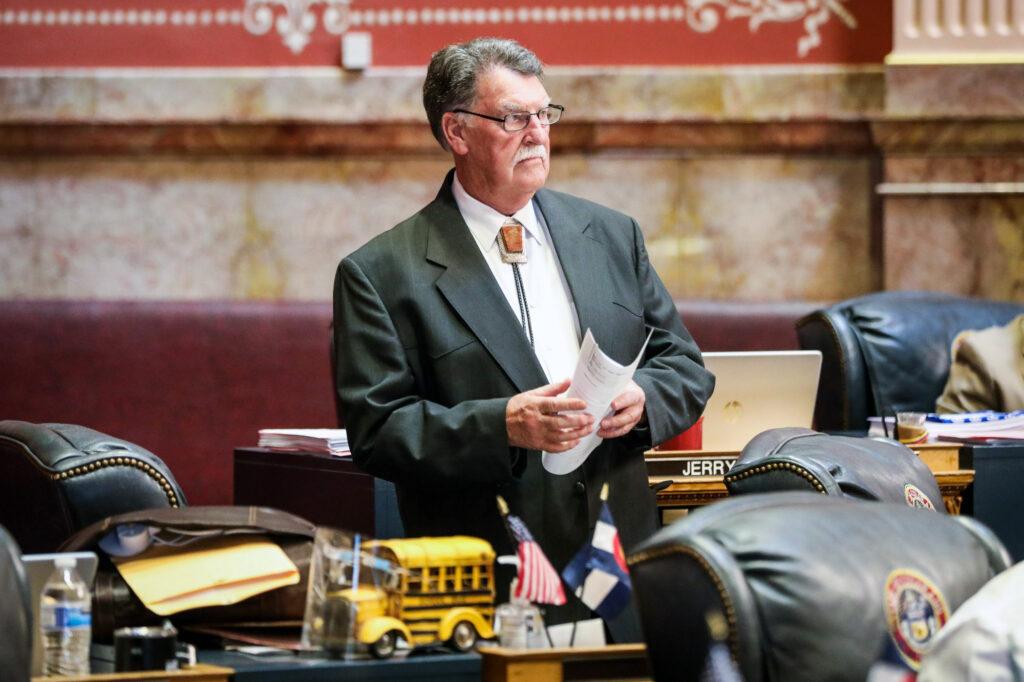
Besides breaking news, rounding up cultural events and informing our audience of all things Colorado, we – the intrepid crew of reporters here in the newsroom of Colorado Public Radio – also like to respond to inquiries from readers.
And on July 11, 2024, we got an inquiry from Rick Donaldson from Littleton, who wrote in to say:
“In 2017, Gov. Hickenlooper signed SB 278 ... which created a $100 fine for drivers emitting clouds of black exhaust smoke from their vehicles (aka "rolling coal"). Can CPR follow up and find out if this law has actually been enforced?"
“It is seven years later and one can observe violators daily on all the major highways of the Denver metro area,” he continued. “It would be informative to find out what has really been done about the problem, with data, records, and interviews. It is not just a nuisance, but also a serious air quality issue.”
Yes, Rick, we can find out what has really been done about the problem – and we did.
I’m back fresh from an Investigative Reporters and Editors convention in June in Anaheim, where I learned the data sorting methods I used for your query. This involved filing a public records request with the Colorado State Patrol, who, a few days later, sent back an Excel spreadsheet with raw data that, once moved into a Google Sheets form, could be manipulated to do calculations.
The main takeaway: 43 people have been cited under the statute since SB17-278, “Prohibit Nuisance Exhibition Motor Vehicle Exhaust” was introduced in March 2017, and signed into law on June 5, 2017.
Sponsored by former State Sen. Don Coram and State then-Rep. Joan Ginal, it “prohibits engaging in a nuisance exhibition of motor vehicle exhaust, which is the act of knowingly blowing black smoke through one or more exhaust pipes attached to a motor vehicle with a gross vehicle weight rating of 14,000 pounds or less in a manner that obstructs or obscures the view of another driver, a bicyclist, or a pedestrian. A person who violates the prohibition commits a class A traffic infraction, punishable by a fine of $100.”

Asked whether a total of 43 apprehensions was what Coram, one of the bill’s sponsors, anticipated when drafting the legislation and whether it was OK to assume he was feeling a little disappointed that less than fifty people have been charged, Coram snapped, “No! I’m pissed off.” By his estimation, 43 people should be cited a day, not over seven years. “I see it at least once a week,” he said.
Coram, whose last day in the State Legislature after more than a decade was at the beginning of 2023, said he had sponsored the bill after seeing a woman in Durango standing on a street corner with a baby or toddler in a stroller when a rolling coal offending motorist pulled up.
“They came up and they put so much coal and they had to rush this baby to …[the] hospital because of all the soot in its lungs and nose ... they just inundated him with black smoke,” he said.
What’s with the black smoke? It’s not regular exhaust that a car would emit. Local media reports indicate that some people deliberately get their cars altered to cause the black smoke, which is unburned fuel, spewing out of their exhaust pipe. One YouTube video shows a Coloradan creating an outlet for the rollin’ coal from the hood of his car. Demonstrating how simple a process it is, he smiles at black exhaust coming from his hood stack.
Other reports indicate that around 2014, rolling coal became a recreational trend wherein drivers display power by emitting the smoke deliberately at the expense of other motorists and pedestrians. Before the law was passed, a Ft. Collins mechanic interviewed by a local TV station said that It was often teens who were doing it.
“To create rolling coal, mechanics do a few tweaks to the piping and computer software on the truck. Diesel pickup truck drivers illegally tweak their engines — tampering with pollution controls and enabling intake of extra fuel — so that by stepping on their accelerator pedals they can blast out spectacularly foul fumes,” the Denver Post reported in 2017.
The citation for rollin’ coal isn’t about normal exhaust fumes.
“If you have white exhaust when it’s not cold out if your pollution control device has been removed, your catalytic converter is damaged… those kinds of things are all different exhaust violations that aren’t included in this 43,” said Colorado State Patrol Sgt. Patrick Rice, who helped contextualize and interpret the data.
The first half-year that the law went into effect – 2017 – didn’t see any citations. In 2018, two people were cited. In the ensuing years, numbers didn’t exactly explode: 11 people were ticketed in 2019; seven in 2020; 12 in 2021; four in 2022; five in 2023; and two so far this year, according to the data.
Most offenders were caught on a highway or interstate; only about 25 percent of stops were on streets or roads, the data show. It’s the more spacious areas that officers are likely going to nab someone whose vehicle isn’t surrounded by other vehicles, said Rice, adding that the data showed that about a third of the citations were written in less heavily trafficked areas including Montrose, Delta and Mesa counties. There were only a few citations in more populated areas like Denver, which didn’t surprise him.
“[In] the more rural areas, troopers have the opportunity to stop people who are blowing visible emissions just because of the congestion of traffic,” he said. “It’s just a little more difficult for a Denver area trooper to make those contacts ... but the rural area, it is just easier for them to be able to make those contacts sometimes.”
In more congested areas, he said, someone rollin’ coal could be a few car distances ahead and not worth risking the safety of others to try to catch.
“Even with our lights on, sometimes traffic doesn’t get out of the way,” he said, adding that chasing motorists who are emitting black smoke isn’t always safe. “So if we’re going eastbound on the interstate and they’re going westbound, the safety factors of trying to get turned around in the middle of a busy congested interstate and make those stops can sometimes be a little restricting.”
Most of the time, a trooper will cite a motorist for rollin’ coal, issue a ticket, and let the driver keep going. But in two of the 43 cases, the stop escalated to a full-on arrest, one of which involved a man going to jail after shoving the officer who was trying to apprehend him.
In June 2021, Colorado State Patrol Trooper Joshua Foster arrested a 55-year-old man from Colorado Springs on Highway 50, which snakes horizontally across the Centennial State. The 12 infractions he was cited for included eluding, obstructing and harassing a police officer; driving recklessly without proof of insurance, emitting exhibition smoke, driving under the influence of drugs or alcohol, and possessing an open container of marijuana.
Foster wrote in his report:
“I contacted a vehicle for speeding 73 MPH in a 55 MPH zone on Highway 50 near milepost 312, eastbound. The vehicle was also weaving, changing lanes when unsafe, flipping other drivers off and dumping exhaust on other vehicles. The vehicle illegally traveled through an intersection and didn’t stop for me. I observed the vehicle’s license plate was hanging at a 45-degree angle. Upon contact with the driver, in a nearby gas station where he stopped, he shoved me. At approximately 20:33 hours, [he] completed voluntary roadside maneuvers. At approximately 21:05 hours, [he] was placed in custody. After being read Colorado Express Consent Law, [he] refused chemical testing. [He] could not provide insurance for the vehicle. I found a glass pipe with used marijuana in the front middle console. [He] was booked in Pueblo County Intake. His vehicle was towed."
Foster, 30, had been on the patrol for about four years when that encounter took place. Reached for an interview about the situation, he recalled that stop in detail but wasn’t sure if it was the speeding or the black plume of smoke that caused him to try to pull the motorist over – a demand to which the motorist did not initially respond.
“It might've even been the smoke that caught my attention first because it was so large,” he recalled. “I would call just his actions in general ‘reckless,’ and that would include the speed, the quick acceleration, the nuisance exhaust ... within a span of 15 seconds he had done all of this.”
He added: “He was not only creating a hazard [by speeding], but also creating this wall of exhaust that, I mean, you're almost driving through ... a thick fog,” he said. “You don't know what's going to be on the other side – if somebody's going to be braking or there's something in the roadway, and that's why it can be an extremely dangerous practice.”
And, Foster surmised, he must have had his vehicle’s engine altered to produce the volume of black smoke. “You have to modify the engine in order to create that smoke. And he probably had a modification both to his engine and his exhaust as well. I remember it being a really big tailpipe.”
When asked why people trick out their cars that way, he said he’s heard there might be “some benefits for power to trucks; how much that is – I'm not a hundred percent certain, but then everybody else that I've chatted with have attributed it to, it is kind of like, for some people it's a machismo thing.”
He said that he’s also heard some people just like seeing a big plume of smoke coming out of their vehicle. “They like the way that it looks, especially when it comes down to that nuisance exhibition of it, whether they're dumping it on other people or when they're racing, they like the look of it.”
Foster was surprised to learn that he was one of the officers who made the most stops under the statue: three in the past seven years. Only a few other offers apprehended more than one person, the data show.


Although the motorist he apprehended faced a truckload of more serious penalties, usually motorists caught rollin’ coal pay a fine and that’s the end of it. “It’s a mail-in ticket,” Sgt. Rice said. “If you don’t mail it in, then you would have to appear in court at the court date at the bottom of the ticket where you would plead not guilty, have a trial to the court, and then they determine if you're guilty or not guilty, and either fine you or send you on your way.”
However, if a person refuses to make the payment, they could lose their right to drive. Without paying the $100 fine, which, with court costs comes out to more like $120, “they would get what’s called a default judgment, which means that they would automatically be guilty by not paying it and not showing up to court. And the fine would remain the same, the hundred dollars plus court costs and their license would then be held in ‘denied’ status until they came and paid that fine.”
The purpose of the fine is to serve as a deterrent to repeat rollin’ coal behavior, but it’s unclear how well it’s working, to the chagrin of former state Sen. Coram, who said at this point there’s nothing he can do to activate adherence to the law, except hope someone speaks up.
“I'm no longer in the General Assembly. I'm going to leave that to someone else,” he said ruefully. “The Judiciary Committee, I would guess, could say this is an issue that's passed in the state of Colorado, but somehow it seems to be not taken seriously”
And motorists aren’t necessarily as deterred as the law’s authors would like if Foster’s 55-year-old arrestee from Colorado Springs from a few years ago is any indication.
“So his case is unique ... well, even more unique,” he said, “because I think it was about a month later he had been arrested again in Colorado Springs for a similar situation.”
Editor's Note: A previous version of this article misstated the data presented. The graph shows the number of citations given, not emissions.









